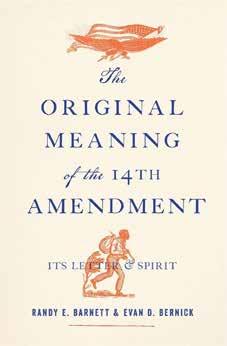
3 minute read
Beltway Bulletin
New Legislation in the House Would Establish Article I Immigration Courts
By Dan Renberg and Cissy Jackson
Advertisement
A former senior Senate staff member and presidential appointee, Dan Renberg has helped numerous clients since joining Arent Fox as a partner in 2003. Recognized as a top federal lobbyist, one of Renberg’s advocacy efforts was included as one of the “Top 10 Lobbying Triumphs of 2009” by The Hill, and he has been listed annually since 2014 in The Best Lawyers in America. Before joining Arent Fox, Cissy Jackson served as counsel and national security adviser to Sen. Doug Jones, D-Ala. Jackson also has extensive experience in the private practice of law, handling white collar, False Claims Act, grand jury investigation, and commercial property tax appeal matters. She has represented multinational corporations, small businesses, and individuals in high-stakes civil and criminal litigation. On Feb. 3, 2022, one of the FBA’s top policy priorities took a giant leap forward. Rep. Zoe Lofgren, D-Calif, introduced long-anticipated legislation to establish independent immigration courts under Article I of the U.S. Constitution.
As chair of the House Immigration and Citizenship Subcommittee, Lofgren laid a firm foundation for the bill in a hearing on Jan. 20, 2022, at which not one but two distinguished FBA members testified in support of the proposal. Elizabeth “Betty” Stevens, former Immigration Section chair, and Hon. Mimi Tsankov, current president of the National Association of Immigration Judges (NAIJ) and a member of the FBA board of directors, set forth the numerous problems with our broken immigration adjudication system, outlined various proposed solutions, and explained why an independent Article I immigration court will best improve the adjudication of immigration cases without having to make changes to substantive immigration law.
This legislation is the product of decades of work and advocacy by the FBA in partnership with the American Bar Association, the Association of Immigration Lawyers, and the NAIJ to, in the words of Judge Tsankov, “craft an enduring solution that would separate the politics of immigration enforcement from the needs of immigration adjudication.” As Betty Stevens elaborated,
This is not a partisan issue. It’s a good government issue. It has nothing to do with substantive immigration laws or broad immigration policy. Whatever the immigration laws are and whatever the policies that inform them, it is past time to lift the courts that apply them from “halfway there, not-quite-courts” to true courts under Article I.
There has been much attention in recent years on the immigration court backlog, which now stands at approximately 1.6 million cases, with an average wait of 1,938 days from charging document to merits hearing. There has been much less focus, however, on the reasons the immigration adjudication system is so dysfunctional.
The Executive Office for Immigration Review (EOIR), which contains the immigration court structure, is housed within the U.S. Department of Justice (DOJ). According to experts, including some leading FBA members, EOIR is a top-heavy bureaucracy, not a true court system. Headquarters programs drain resources that should be devoted to adjudication. Unlike other judges, immigration judges have little control over their dockets and cannot use their contempt authority to manage litigants. Each new administration pulls the 69 EOIR immigration courts from one political priority to another, crippling their efficiency and decimating due process. DOJ does not consider Board of Immigration Appeals (BIA) members and immigration judges to be independent decision-makers; indeed, they can be disciplined if the attorney general disagrees with their decisions. This potential political influence means there can be no guarantees of either due process or decisions made solely based on the law. Moreover, as Stevens explained in her testimony,
a broad perception exists that the immigration courts merely rubber-stamp DHS actions. Because of this perception, individuals often do not pursue relief for which they might be eligible. [This perception] also leads to more petitions for review in the circuit courts, as the hope of impartial review in federal court postpones finality and undermines the authority of BIA determinations.
Lofgren’s bill would provide transparency regarding removal proceedings, judges’ conduct, and discipline. It would allow judges to manage their caseloads without undue pressure from the political branches and would free resources for much-needed modernization of videoconferencing and electronic filing systems. Although the bill as introduced insufficiently addresses the government’s right to appeal, the FBA hopes to continue to work with









